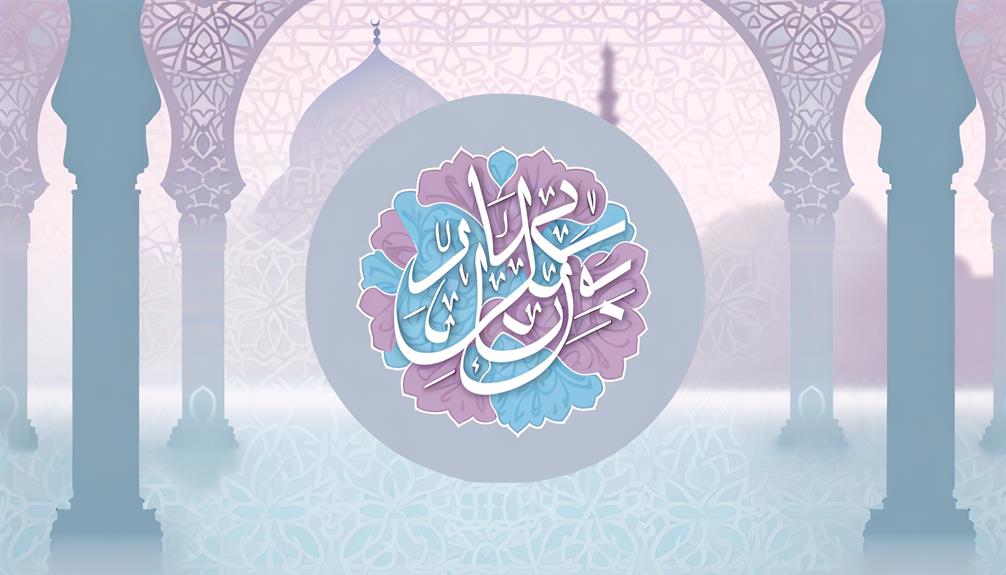Ayesha Name Meaning in Islam
Ayesha, derived from the Arabic root 'aish', translates to 'living' or 'life' and symbolizes vitality and energy. In Islamic history, Ayesha bint Abi Bakr, the wife of Prophet Muhammad, is esteemed for her intelligence, moral integrity, and significant contributions to Islamic scholarship, including the compilation of Hadiths.
She is celebrated as 'Mother of the Believers'. The name Ayesha holds significant cultural and religious importance, embodying qualities of piety, knowledge, and vigor.
It remains a cherished name within the Muslim community, reflecting a life full of purpose and significance. Further exploration reveals its profound historical and cultural impact.

Key Takeaways
- Ayesha means 'living' or 'life' in Arabic.
- The name symbolizes energy, vitality, and a zest for life.
- Ayesha bint Abi Bakr, wife of Prophet Muhammad, is a significant historical figure.
- The name reflects values of wisdom, moral integrity, and piety in Islamic tradition.
- Ayesha is widely cherished and popular in Muslim communities.
Etymology of Ayesha
The etymology of the name Ayesha traces its origins to the Arabic language, where it is derived from the root word 'ʿaish,' meaning 'living' or 'life.'
In Arabic, 'Ayesha' (عائشة) is commonly understood as 'one who is alive' or 'living one.' This name carries connotations of energy and vivacity, reflecting a positive and life-affirming attribute.
The phonetic structure and linguistic roots of the name are embedded in the rich traditions of Arabic nomenclature, which often emphasizes meaningful and auspicious qualities.
The name Ayesha remains widely used in various cultures and regions, signifying its enduring appeal and relevance. Its linguistic simplicity coupled with profound meaning contributes to its enduring popularity across generations.
Historical Significance
Ayesha holds significant historical importance in Islamic culture, particularly as the name of one of Prophet Muhammad's wives, Aisha bint Abi Bakr. Aisha, often referred to as 'Mother of the Believers,' played a pivotal role in early Islamic history. She was renowned for her intelligence, scholarship, and strong character.
Aisha contributed extensively to the compilation of Hadiths, the sayings and actions of Prophet Muhammad, thereby shaping Islamic jurisprudence and theology. Her narratives provide critical insights into the Prophet's life and the early Muslim community. Aisha's legacy extends beyond her religious contributions, as she was actively involved in political matters, including the Battle of the Camel, underscoring her influence in Islamic history.
Ayesha in Islamic Tradition
Ayesha holds a prominent place in Islamic tradition, both for her historical significance as the wife of the Prophet Muhammad and for her role in religious teachings. Her life and contributions are emblematic of piety and knowledge, often serving as a symbol of virtue and wisdom in Islamic scholarship.
Understanding Ayesha's impact involves examining her influence on the early Muslim community and her enduring legacy in Islamic thought.
Historical Significance
In Islamic tradition, Ayesha bint Abu Bakr holds a noteworthy place as one of the most esteemed and influential women in early Islamic history.
As the wife of Prophet Muhammad and daughter of Abu Bakr, the first Caliph, Ayesha's role extended beyond her familial ties. She was a key figure in the transmission of Hadith, contributing notably to Islamic jurisprudence and scholarship.
Her keen intellect and strong character made her an authoritative source on various matters, including theology, ethics, and law.
Ayesha's participation in important historical events, such as the Battle of the Camel, further underscores her pivotal role in shaping early Islamic society.
Her legacy continues to be revered and studied by scholars and believers alike.
Religious Symbolism
As a revered figure in Islamic tradition, the religious symbolism associated with Ayesha bint Abu Bakr is deeply intertwined with notions of wisdom, piety, and scholarly dedication. Ayesha, the beloved wife of Prophet Muhammad, holds a significant place in Islamic history and thought. Her life and actions exemplify the virtues of faith and learning, making her an enduring symbol of female scholarship and moral integrity.
- Wisdom and Knowledge: Ayesha is renowned for her vast knowledge of Hadith and Islamic jurisprudence.
- Piety and Devotion: Her commitment to spiritual and religious practices sets a high standard for devoutness.
- Role Model: As a teacher and leader, Ayesha serves as an inspirational figure for Muslim women and men alike.
These elements highlight her lasting impact on Islamic tradition.
Cultural Impact
The name Ayesha holds considerable historical significance in Islam, primarily due to its association with Ayesha bint Abu Bakr, one of Prophet Muhammad's wives.
This legacy has secured the name's enduring popularity and influence, leading to its widespread adoption in various Muslim communities.
Additionally, the name has transcended cultural boundaries, becoming a common choice in modern times, reflecting both its historical roots and contemporary appeal.
Historical Significance in Islam
Ayesha's name holds profound historical significance in Islam, primarily due to her esteemed role as one of Prophet Muhammad's wives and her influential contributions to early Islamic society. Known for her intelligence, Ayesha played a critical part in the spreading of Hadiths and Islamic law. Her life and actions provided essential insights into the Prophet's teachings, making her a pivotal figure in Islamic history. Additionally, her participation in significant events, such as the Battle of the Camel, underscores her active engagement in shaping the nascent Muslim community.
- Spreading of Hadiths: Ayesha narrated over 2,000 Hadiths, providing key religious guidance.
- Islamic Law: Her interpretations influenced early Islamic jurisprudence.
- Critical Events: Ayesha's involvement in crucial events like the Battle of the Camel marked her as a leader.
Influence on Modern Names
Her lasting impact on Islamic history naturally extends to the contemporary cultural significance of the name 'Ayesha,' which remains a popular choice among Muslims worldwide. This preference is deeply rooted in the reverence for Ayesha bint Abi Bakr, the wife of the Prophet Muhammad, known for her intelligence, piety, and significant contributions to Islamic scholarship.
The name 'Ayesha' symbolizes virtues such as wisdom, devotion, and resilience, making it an aspirational choice for many parents. Additionally, its phonetic appeal and ease of pronunciation across different languages contribute to its widespread use.
Consequently, 'Ayesha' continues to be a name that not only honors Islamic heritage but also resonates with modern values and global cultural connectivity.
Famous Namesakes
Renowned throughout history, Ayesha has been a name borne by several influential and respected figures in Islamic culture. Ayesha bint Abu Bakr, the beloved wife of Prophet Muhammad, holds a prominent place. Her extensive knowledge and contributions to Hadith literature and Islamic jurisprudence are widely acknowledged.
Another noted figure is Ayesha Siddiqa, a contemporary Pakistani military scientist and author, known for her critical analyses of military and political affairs.
Additionally, Ayesha Jalal, an esteemed historian, has made significant contributions to South Asian studies through her scholarly works.
- Ayesha bint Abu Bakr: Wife of Prophet Muhammad, influential in Hadith literature.
- Ayesha Siddiqa: Pakistani military scientist and author.
- Ayesha Jalal: Esteemed historian specializing in South Asian studies.
Modern Usage
In contemporary times, the name Ayesha continues to be popular and widely used across various cultures, reflecting its rich historical significance and enduring appeal. Its prevalence can be seen in diverse regions, from the Middle East to South Asia and beyond. The name's versatility allows it to transcend cultural boundaries, making it a favored choice among parents seeking a name with profound roots and timeless resonance.
| Region | Popularity |
|---|---|
| Middle East | High |
| South Asia | Very High |
| North America | Moderate |
| Europe | Growing |
Ayesha's modern usage demonstrates an ongoing appreciation for its historical and cultural heritage, ensuring its continued relevance in contemporary naming conventions.
Symbolic Meanings
Ayesha’s name carries deep symbolic meanings within Islamic tradition, reflecting attributes of living, life, and significance. Rooted in Arabic, Ayesha translates to ‘alive’ or ‘living,’ signifying energy and a zest for life. This name is closely associated with Ayesha bint Abu Bakr, the esteemed wife of Prophet Muhammad (PBUH), embodying wisdom, scholarship, and moral integrity. The symbolic meanings of Ayesha extend beyond mere existence to encapsulate the essence of a life well-lived and revered. Moreover, the name Ayesha also resonates with compassion and nurturing qualities, as Ayesha bint Abu Bakr was known for her generous spirit and dedication to her community. This depth of character enriches the understanding of the name, illustrating its connection to morality and leadership. In contrast, the significance of the name ‘iqran’ offers a different perspective, with ‘iqran name meaning explained‘ highlighting its unique connotations and attributes within various cultural contexts, thereby emphasizing the importance of names in conveying identity and values.
- Energy and Life: Ayesha signifies being alive and thriving.
- Historical Significance: Ayesha bint Abu Bakr's legacy adds depth to the name.
- Moral Integrity: Reflects the values of wisdom and ethical conduct.
This rich symbolism makes Ayesha a cherished name in Islamic culture.
Conclusion
The name Ayesha, rich in etymology and history, holds profound significance within Islamic tradition. It is not merely a name but a symbol of strength, wisdom, and piety, deeply rooted in the legacy of Ayesha bint Abu Bakr, a revered figure in Islam.
The cultural impact of this name continues to resonate through the ages, influencing modern usage and inspiring countless individuals. Through its enduring legacy, the name Ayesha remains a beacon of virtuous qualities and timeless values.






